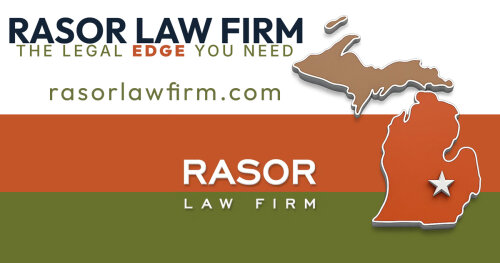Best Toxic Mold Lawyers in Maryland
Share your needs with us, get contacted by law firms.
Free. Takes 2 min.
Or refine your search by selecting a city:
List of the best lawyers in Maryland, United States
About Toxic Mold Law in Maryland, United States
Toxic mold refers to certain types of molds that can cause adverse health effects in people exposed to them, often due to the production of mycotoxins. In Maryland, toxic mold is a growing legal concern in residential, commercial, and rental properties. Exposure to mold can lead to allergic reactions, asthma attacks, respiratory issues, and in severe cases, long-term health complications. Mold problems commonly arise after water damage, leaks, or inadequate ventilation. Legal claims related to toxic mold often involve property owners, landlords, tenants, insurers, and builders.
Why You May Need a Lawyer
Dealing with toxic mold issues can quickly become complicated. You might need a lawyer experienced in toxic mold cases if:
- You are a tenant experiencing health issues or property damage due to mold in your rental unit, and your landlord is not responsive.
- You are a homeowner who purchased a property with undisclosed mold problems.
- You have insurance coverage disputes related to mold damage in your home.
- You are facing costs for remediation or property devaluation due to mold contamination.
- Remediation or cleaning is not effective or worsens the problem.
- You are a landlord being accused of ignoring or improperly handling mold complaints.
- You need help understanding your legal obligations regarding disclosure and cleanup.
A lawyer can help you navigate Maryland’s complex real estate, landlord-tenant, and insurance laws. They can negotiate on your behalf, help you pursue compensation for damages or injuries, or defend you against claims.
Local Laws Overview
Maryland does not have a specific statute exclusively regulating toxic mold in private homes, but several state and local laws touch upon the responsibilities of property owners and landlords concerning mold:
- Implied warranty of habitability: Maryland law requires landlords to provide rental units that are safe and habitable, which includes addressing mold problems that could affect health and safety.
- Disclosures: Sellers of residential property in Maryland must disclose known latent defects, which can include significant mold issues.
- Remediation: Some Maryland counties and cities have ordinances that require specific remediation steps or reporting for properties with confirmed mold contamination, particularly in rental housing.
- Insurance: Insurance policies may have limitations or exclusions related to mold damage, and Maryland law governs how coverage is interpreted.
- Public health: The Maryland Department of Health provides guidance and can sometimes intervene in cases where mold presents a public health risk.
Victims suffering health problems or economic losses due to mold may have claims under Maryland’s general negligence, contract, or consumer protection statutes.
Frequently Asked Questions
What are the health risks of toxic mold exposure?
Exposure to toxic mold can cause coughing, sneezing, skin rashes, eye irritation, sinus congestion, asthma attacks, and in rare cases, severe respiratory or neurological issues. Some people are more sensitive than others, especially children, elderly individuals, and those with compromised immune systems.
Can I sue my landlord for mold-related problems in Maryland?
Yes, you may be able to pursue legal action if the landlord fails to maintain safe and habitable living conditions, ignores your mold complaint, or if mold makes the property uninhabitable. Document the problem and your communication with the landlord.
Does Maryland law require landlords to test for or remove mold?
Maryland law does not specifically require regular mold testing, but landlords are responsible for fixing water leaks and moisture issues that can lead to mold under the implied warranty of habitability.
What should I do if I discover mold in my rental property?
Notify your landlord in writing as soon as possible. Request prompt inspection and repairs, and keep records of all communications. If the landlord fails to act, contact local housing authorities.
Are home sellers in Maryland required to disclose mold problems?
Yes, sellers must provide written disclosure of latent defects they know about, including mold problems, when selling most residential real estate.
How do insurance policies in Maryland handle mold claims?
Coverage varies. Many policies exclude damage caused by long term leaks or maintenance issues, while sudden and accidental leaks might be covered. Always review your policy and consult your insurer.
Can I break my lease due to toxic mold?
If the mold significantly affects your health or the habitability of the rental, you may have grounds to terminate your lease. Legal advice is recommended before taking this step.
What is the statute of limitations for mold-related claims in Maryland?
Generally, you have three years to file a personal injury or property damage lawsuit in Maryland, but deadlines can vary depending on circumstances and types of claims.
Who is responsible for mold removal in Maryland rental properties?
Landlords are generally responsible for mold removal resulting from leaks or defects they control. Tenants may be responsible if mold results from their own negligence.
What evidence should I gather for a toxic mold legal case?
Take photographs of the mold, obtain mold inspection or environmental reports, keep medical records and documentation of symptoms, and save all communications with your landlord, seller, or insurer.
Additional Resources
- Maryland Department of Health - Environmental Health Bureau: Offers information on mold and its health effects.
- Maryland Attorney General’s Office - Consumer Protection Division: Provides assistance on housing and landlord-tenant issues.
- Local county and city housing offices: Can inspect properties and enforce housing codes related to habitability and mold.
- U.S. Environmental Protection Agency (EPA): Publishes guides on identifying, cleaning, and preventing mold problems in homes and businesses.
- Legal Aid Bureau of Maryland: May provide free or low cost legal assistance to qualifying residents with housing issues.
- American Industrial Hygiene Association (AIHA): Offers a list of certified professionals for mold assessment and remediation.
Next Steps
If you are facing toxic mold issues in Maryland, take these steps:
- Document the problem with photographs and written notes.
- Notify the responsible party, such as your landlord or property manager, in writing.
- Retain copies of all correspondence and responses you receive.
- Seek medical attention if you suffer health symptoms linked to mold.
- Contact your local health department or housing authority if the issue is unresolved.
- Consult with a Maryland lawyer experienced in toxic mold cases to review your situation, your rights, and your options for resolution or compensation.
Taking timely action and seeking expert legal advice can help protect your health, financial interests, and legal rights.
Lawzana helps you find the best lawyers and law firms in Maryland through a curated and pre-screened list of qualified legal professionals. Our platform offers rankings and detailed profiles of attorneys and law firms, allowing you to compare based on practice areas, including Toxic Mold, experience, and client feedback.
Each profile includes a description of the firm's areas of practice, client reviews, team members and partners, year of establishment, spoken languages, office locations, contact information, social media presence, and any published articles or resources. Most firms on our platform speak English and are experienced in both local and international legal matters.
Get a quote from top-rated law firms in Maryland, United States — quickly, securely, and without unnecessary hassle.
Disclaimer:
The information provided on this page is for general informational purposes only and does not constitute legal advice. While we strive to ensure the accuracy and relevance of the content, legal information may change over time, and interpretations of the law can vary. You should always consult with a qualified legal professional for advice specific to your situation.
We disclaim all liability for actions taken or not taken based on the content of this page. If you believe any information is incorrect or outdated, please contact us, and we will review and update it where appropriate.
Browse toxic mold law firms by city in Maryland
Refine your search by selecting a city.














